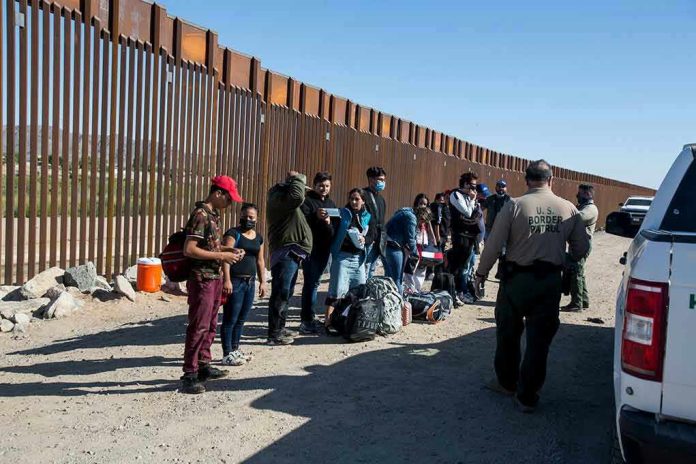
When the U.S. government finally gets serious about border security, illegal crossings plummet to record lows—meanwhile, the political class keeps finding new ways to funnel billions to “border-related” programs that don’t seem to help the average American one bit.
At a Glance
- Illegal border crossings have dropped to the lowest monthly levels in decades, thanks to aggressive enforcement measures.
- Congress is pushing massive new funding for border security and state-run enforcement, but also keeps controversial spending for “humanitarian needs” in the mix.
- The Trump administration has enacted executive orders empowering federal and state authorities to detain and remove illegal aliens rapidly.
- Despite proven results, attempts to roll back grants for programs aiding newly arrived migrants have met stiff resistance on Capitol Hill.
Record-Breaking Drop in Illegal Border Crossings
Border Patrol encountered just 6,070 illegal immigrants at the southern border in June—a historic low, and a full 15% drop from the previous record set in March. The number of “gotaways”—those who manage to slip through undetected—has collapsed by 90% compared to last year. For the second month in a row, not a single illegal immigrant was released into the interior of the country. It’s a staggering reversal from the chaos of the previous administration, when tens of thousands of unvetted migrants poured across the border and into American communities every week. This is what happens when the federal government actually does its job and stops caving to the open-borders lobby.
June 28 set a single-day record for border security, with only 137 illegal immigrant encounters nationwide. This fiscal year is shaping up to be the most secure in half a century. But as always, the self-appointed elites in Washington are still scrambling to find ways to water down enforcement and keep their favorite programs alive. The “One Big Beautiful Bill” in Congress promises to finally finish the wall, hire thousands of new agents, and ramp up deportations. But how many times have we heard those promises before—only to see the money rerouted for “humanitarian” nonprofits and migrant shelters?
Billions for Border Security—But Where Does It Really Go?
The latest House reconciliation bill is a perfect snapshot of D.C. dysfunction. On the one hand, Congress approved $12 billion in grants for states that have supported tough border enforcement. Texas alone stands to be reimbursed for over $11 billion spent on its own Operation Lone Star effort. The Senate version throws in another $10 billion for a “State Border Security Reinforcement Fund,” and $3.5 billion for reimbursements tied to local immigration detention and prosecution costs. Sounds good—until you read the fine print.
This windfall is supposed to reward states for doing the work the federal government failed to do, but, predictably, there’s a catch: House Democrats (and a few GOP turncoats) tried to sneak in language that would keep the spigots open for programs designed to “respond to the urgent humanitarian needs of newly-arrived migrants.” The Trump administration, to its credit, has paused those grants and wants to eliminate them completely in the next budget. But the open-borders crowd is never satisfied—they keep fighting for loopholes, court orders, and legal technicalities that delay real enforcement and drain taxpayer dollars.
Trump Administration’s No-Nonsense Approach to Border Enforcement
President Trump’s executive orders have finally put the nation’s security back on the agenda. The White House policy is simple: stop unlawful mass migration, deploy physical barriers, and empower federal and state authorities to detain, prosecute, and remove anyone violating immigration laws. No more catch-and-release, no more sanctuary loopholes, no more endless litigation that keeps dangerous individuals in the country on the taxpayer dime. The administration’s orders instruct the Department of Defense and Homeland Security to build and maintain both temporary and permanent barriers, and to seek full operational control of the border. Cooperation with state and local law enforcement is now the rule, not the exception.
These commonsense measures are already paying off. Illegal crossings are at historic lows, and law enforcement finally has the tools it needs to protect American communities. Critics can howl about “humanitarian crises” all they want—real compassion means securing the border, upholding the law, and putting American citizens first. The alternative is what we saw for years: chaos, lawlessness, and a system rigged against the very people who pay the bills.
The Never-Ending Fight Against Government Waste and Border Loopholes
Of course, no good deed goes unpunished in Washington. While the Trump administration has slashed illegal immigration and restored order, the permanent bureaucracy is still addicted to spending and red tape. The reconciliation bill’s border funding almost got torpedoed by the Senate Parliamentarian, who pointed out that authorizing state and local officials to arrest suspected illegals is a federal function. In the end, the bill survived—after lawmakers added language clarifying that all authority must conform to existing statutes. Translation: expect more lawsuits, more activist judges, and more attempts to roll back the progress that’s been made.
Meanwhile, taxpayer money keeps flowing to programs that do nothing to secure the border, while politicians grandstand about “reform” and “compassion.” If Congress really cared about border security, it would pass the “One Big Beautiful Bill” without loopholes, strings, or carveouts for the open-borders lobby. Until then, Americans will keep footing the bill for policies that put everyone but citizens first. The Trump administration has shown what works; now it’s up to Congress to finish the job—or get out of the way.




